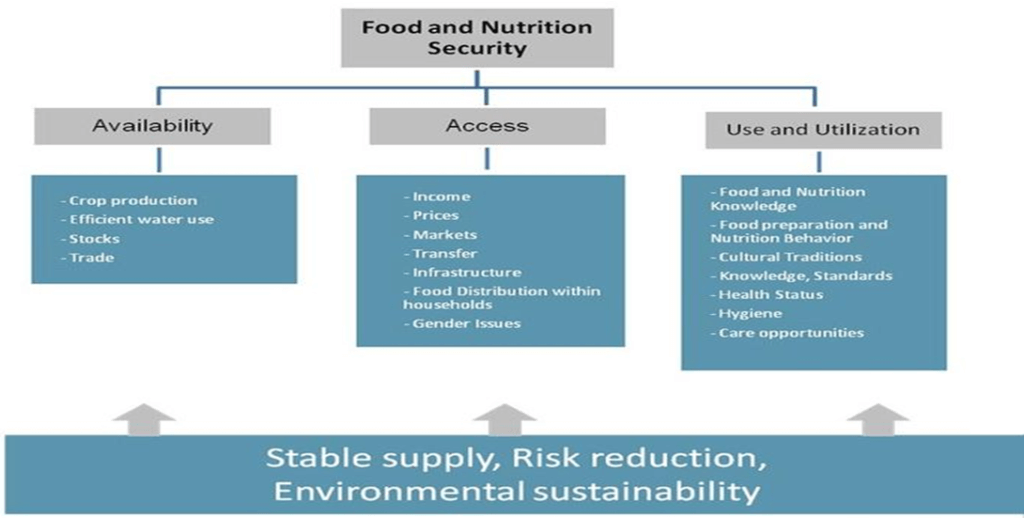Hindu Editorial Analysis: 4-May-2023
Ensuring proper nutrition for the entire population is crucial for a healthy and prosperous nation. This essay explores the need for a national effort to establish routine dietary and nutritional assessments in India. It highlights the alarming statistics related to zero-food, zero-protein, and zero-milk consumption among young children, as well as the challenges posed by severe food insecurity and the rising burden of non-communicable diseases. The essay also provides suggestions to address these issues and improve existing policies, such as Mission Poshan 2.0 and Pradhan Mantri Garib Kalyan Anna Yojana.
Data on Food Consumption Patterns:
- At six months of age, the World Health Organisation recommends that 33 percent of daily calorie intake should come from food, which increases to 61 percent by 12 months.
- The fifth National Family Health Survey (NFHS-5) conducted in 2019-21 revealed that 18 percent of mothers reported their child not consuming any food in the preceding 24 hours.
- Zero-food prevalence was 30 percent for infants aged 6-11 months, 13 percent among 12-17 months old, and 8 percent among 18-23 months old.
- More than 80 percent of children in the age group of 6-23 months did not consume any protein-rich foods (“zero-protein”).
- Nearly 40 percent did not eat any grains, and six out of 10 children did not consume milk or dairy products at all (“zero-milk”).
Issues and Challenges:
- Severe Food Insecurity:
- Going without food for a whole day during a child’s critical development period raises concerns about severe food insecurity.
- Faulty Assessment:
- Current assessments rely on anthropometric measures, such as stunting and wasting, which only provide limited information on overall deficiencies without specifying their nature.
- Non-communicable Diseases:
- The increasing burden of cardiovascular and other non-communicable diseases in India, especially among the middle class, is strongly linked to diet and nutrition.
Suggestions:
- Access to Nutritious Food:
- Prioritize food intake among young children as a primary concern rather than considering it complementary.
- Ensure access to adequate and affordable nutritious food for both children and mothers for healthy breastfeeding.
- Improved Assessments:
- Adapt household-level food insecurity modules developed by the Food and Agriculture Organisation to measure the extent of food insecurity in Indian households.
- Evidence-based Policy:
- Measure the availability, accessibility, and affordability of nutritious food, particularly for disadvantaged populations, to develop evidence-based policies and improve nutritional security.
Suggestions for Improving Existing Policies:
- Mission Poshan 2.0:
- Align Mission Poshan 2.0, the flagship programme for maternal and child nutrition, with SDG 2 “zero hunger.”
- Develop appropriate food-based metrics to monitor and assess the program’s performance.
- Pradhan Mantri Garib Kalyan Anna Yojana:
- Consider a strategic initiative led by the Prime Minister’s Office to eliminate food insecurity and ensure affordable access to sufficient and diverse nutrition for India’s youngest children.
- Build on the success of Pradhan Mantri Garib Kalyan Anna Yojana, which increased access to improved toilets, by using trackable metrics and political commitment.

Why In News
With the rising concerns about food insecurity and inadequate nutrition, implementing routine dietary and nutritional assessments for the entire population has become a critical imperative in India.
MCQs about Addressing Food Insecurity and Improving Child Nutrition in India
-
What is the primary focus of Mission Poshan 2.0?
A. Access to improved toilets in households
B. Eliminating food insecurity in India
C. Promoting exclusive breastfeeding
D. Reducing non-communicable diseases
-
Which of the following is NOT mentioned as a specific food group that young children in India are deprived of?
A. Protein-rich foods
B. Grains (roti, rice, etc.)
C. Dairy products
D. Fruits and vegetables
- Which initiative is suggested in the essay to monitor and assess the performance of Mission Poshan 2.0? A. Developing appropriate food-based metrics B. Implementing a nationwide nutrition awareness campaign C. Expanding the coverage of mid-day meal programs D. Collaborating with international organizations for research studies
Boost up your confidence by appearing our Weekly Current Affairs Multiple Choice Questions
![]()


